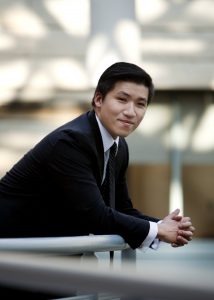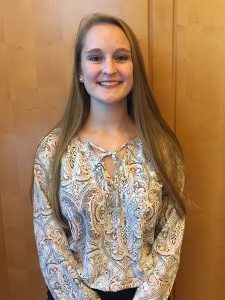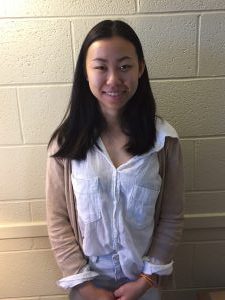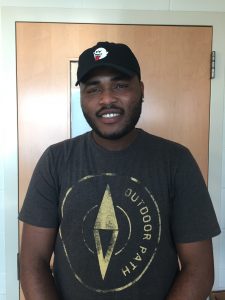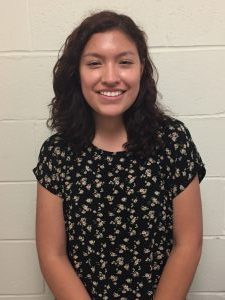Welcome to Live and Learn, a production of the Honors Program at the University of Connecticut. I’m Danielle Chaloux, and this is episode 3.
The Holster Scholars First Year Project is an enrichment opportunity for curious first-year Honors students. Holster projects are in-depth, individualized learning experiences completed during the summer after the first year (so for current first year students, 2018). Beyond some basic requirements, projects are self-designed. Scholars receive $4,000 in research support to complete their projects during the summer under the guidance of a faculty member.
Interested in learning more? There’s an information session on Monday, October 16, at 7:00pm in the Buckley Classroom.
Here’s 2016 Holster Scholar Katie Grant, who investigated the public perception of school choice options in Connecticut.
[Katie Grant]: to the students that were in my position two years ago, go for it, it’s something you won’t regret. No matter if it comes out in a successful Holster acceptance or not you will learn something about yourself through it and that’s the most valuable thing you can get.
As the semester is now fully underway, stress levels all over campus are rising.
Counseling and Mental Health Services offers a wide range of options for students. They include clinical services such as individual therapy, group therapy, and on call support 24/7, as well as free activities, such as drop in consultation hours, yoga classes and various workshops throughout the semester.
To learn more, visit counseling.uconn.edu, or call 860-486-4705
Here’s Dr. Erin Cox from CMHS to talk about stress and perfectionism.
[Dr. Erin Cox]: One thing that I always like to emphasis is that stress itself is not a bad thing. It’s just really how that stress is impacting us or how we think about that stress. At certain levels stress is pretty normal throughout college. If you have midterms coming up that’s going to be a stressful experience and perhaps would help you be more motivated to study and do well. That being said, a lot of student are impacted by numerous stressors at once and that might build up to become something more like anxiety or depression or other types of more significant health concerns where it’s starting to impact your ability to function.
So there’s a number of self-help strategies that’s I’m a big fan of. One of my favorites would be something like meditation or deep breathing exercises. There’s a lot of great YouTube videos and apps out there that offer instruction on how to mediate. My favorite strategy is called diaphragmatic breathing. It’s a specific technique that taps into our relaxation response, which is through our parasympathetic nervous system, and the technique for this is to kind of breathe, essentially, into your belly. So your diaphragm is an organ right above your belly and when you breathe into your diaphragm you are triggering this response in your body. Your nervous system thinks “I’m safe now. I’m breathing in a calm manner. And that sends a message to your brain.” The trick is to kind of take nice slow breaths in and out of your nose and maybe about counting about 3 to 6 counts in and 30 to 6 counts out and really focusing on getting it into your belly. If you do this for a few breaths that’s great, but it’s actually even more effective if you’re doing it for about 5 minutes per day, in a kind of meditation practice.
So I personally like to use apps as a guide, because if I don’t have a guide, I will only meditate for about one or two minutes and then I get bored, so use a guide and that will kind of help you stay track on time.
One of my other favorite strategies is to really consider the way we think about stress. When we’re stressed out, we tend to think about things in a more illogical, maybe more negative way than what is actually the reality of the situation. And so sometimes when we take a step back, we can see the more logical ways of thinking. And there’s a whole field of therapy called cognitive behavioral therapy, that’s based on this principle. And they’ve identified what they call cognitive distortions, which are specific ways in which people think about things that are a little bit more illogical. Essentially what you want to do is learn to recognize when you’re using a cognitive distortion. For example, magnifying a problem, so if I fail this exam, I assume that I failed the class and that I failed out of college; that would be an example of magnification. What you want to do with that is kind of step back and say “I am magnifying right now, what’s an alternative way of viewing this problem? Well, I failed the exam, that’s not great, but maybe if I talk to the professor or the TA, if I have a study group, if I think about a different way to study, then I can turn it around, and one exam does not make my final grade.”
So that would be a way that you’re challenging that thought. And that’s essentially the idea with cognitive behavioral therapy – to identify negative thought patterns and to challenge them.
One thing I’d really like to emphasize are our free drop in services. One thing that we often hear from students is concern about wait time for getting in for therapy, things like that. To a certain degree, there can be a wait time, just like when you call a doctor’s office or a dentist’s office, things like that. But we do have a lot of rapid access services. So certainly our emergency on call services are available, but our drop in consultation program, which is technically called the “Consultation and Support Hour,” is a really amazing service for students, you know if you’ve just gone through a breakup, if you’re having a roommate problem, if you’re struggling with test anxiety. Our clinicians are trained to identify these concerns and give you tools, resources, referrals to other campus agencies that can really be helpful, and often, actually, many of the students who use the drop in service find that they do not need to come back for longer term therapy. They find that those resources were enough to get them through that one particular difficult time. So that’s one of my favorite services that we offer, and that is free. It’s available on a first come, first serve basis every day of the week during the school year.
UConn Recreation offers a wide variety of programming opportunities. Over the next few weeks, Live and Learn will dig a little deeper into what’s offered. Today, we’ll hear from Steve Drasdis, Coordinator of Club Sports, as well as Meg O’Neil and Ashleigh Jepson, both students involved with clubs sports. But first, some information on the new recreation facility that’s currently under construction.
[Cyndi Costanzo]: My name is Cyndi Costanzo, I am the executive director of UConn Recreation.
[DC]: You’re the person in charge of the big construction project happening on Hillside Road.
[CC]: I absolutely am. It’s very exciting! I call it my building, which I’m not really sure that’s what the university is calling it, but it feels very much like my building. Uh, the project is on time. It is also on budget, which is great. And, we will plan to open that building in August of 2019. And so students that are on the campus right now will be using that building. And we’re very excited about that.
[DC]: And what will it look like when it’s done?
[CC]: For students that are on the campus, they can stop by the Student Union right now and see our video fly through, as well as the two models that we have available for students to see. And really, capture the essence of how, how big the building is. We developed a fantastic aquatic center, which will be two individual pools, and that will really meet the need of a lot of our club sports athletes as well as our recreational users. We’ll have four fitness centers. One of the fitness centers that we have outlined right now will house more equipment than what is currently available in the entire recreation center. We also will have four gymnasiums with wood court floors as well as two additional, what’s called a MAC court, or a Multi Activity Court, more of a synthetic surface. Those six courts are surrounded, by a really unique design, an indoor running track. And then we have our outdoor adventure center, which will be part of the actual building, which now most people know that’s an annex program for us and available in the Union. Now in there it will run all the programs that we currently run, our cycle share program, signup for our weekend adventure programs where we take students to offsite locations, from everything from mount biking to ice climbing, etc. In addition we will expand our climbing center. Currently we have a relatively small, mostly bouldering climbing center. We will expand the bouldering that will be available in our new climbing center but will also add the high climbing elements. And we will be the home to the 55 foot high climbing center, which will be the largest in New England!
[DC]: And here’s the club sports team.
[Steve Drasdis]: So we have 39 club sports, ranging from men and women’s soccer, women’s basketball, baseball, softball, men and women’s rugby to more nontraditional sports such as woodsmen, skydiving. We have three different horse disciplines, so pretty much something for everybody. You don’t have to have any experience with some of these clubs to participate. Obviously if you try out for the men’s lacrosse team and you have no idea about lacrosse, you don’t know what a lacrosse stick is, that might not be something that is going to work for you. But we have other sports, even if you have never tried them that you can come out and try. So running, for example, or archery, you can go out and try it even if you have never done it. If you just want to run recreationally, you fit and run with them. They have group runs four to five times a week, you can do that as long as you’re following the membership requirements, paying your dues. But if you really want to be competitive and compete and you want to go to the races, they take 45+ members to the races on weekends, so you can go do that. Similar to archery, where they have a competitive team and they go and they compete at a very high level but then they have people who just come to practice twice a week and practice their shooting on targets. So, it’s a really cool dynamic where you don’t have to be experienced in some of these clubs. You can come in and you kinda learn. Rugby is another good example, where we have a lot of athletes that have even played varsity sports or have played high school football and they want to go to the next level but they don’t know what to do and they’re very athletic, rugby pretty much takes anyone. And, that’s one of those things where they can come and participate in a new sport, a unique sport that is growing in America and be really successful.
[Meg O’Neil]: That also opens up the opportunity to be on more than one club sports team, which I think is awesome since D1 takes up so much of your time that you can’t really be on two D1 sports teams. But with club sports I see athletes all the time going from practice to practice and just being able to try out different kinds of sports which is a great opportunity.
[SD]: The way that we have it set up is that these teams, while they might not be competing all year, they’re kinda doing things as a team from August usually through April and when the school year ends.
[DC]: So it being October now, is it too late to get involved in club sports?
[SD]: No, again some of that goes back to tryouts, so we have those set tryout dates that they need to attend. Some of our clubs will have fall and spring tryouts, some will not. We do have certain roster deadlines in general, so for example a team like running that will take everyone, October 13th is our fall roster deadline this year, when for the fall no one can join after that date. But then in the spring when classes begin around MLK day, in the spring there is six week window where people can join teams again if teams are accepting new members.
[DC]: And the best part of club sports?
[Ashleigh Jepson]: I would say the best part of being on a club sport is that it really is that, it’s a club and you’re getting to play the sport that you love. So, you’re not just joining a team, like in high school, but you’re getting a whole new network of people you might not have met otherwise at this huge university. It really does make UConn feel smaller, and these teams act like a family. They have dinners, they have practices and team bonding events all throughout the year. You’re really joining a close group of friends that you’ll have for the next four years.
[DC]: And maybe beyond.
[S2]: Yeah!
[DC]: If you’re interested in club sports, check out . That’s all for this week! To enter to win Honors Programming swag, provide feedback, and suggest future segments, visit , where the code word is BALANCE. (outro music)
